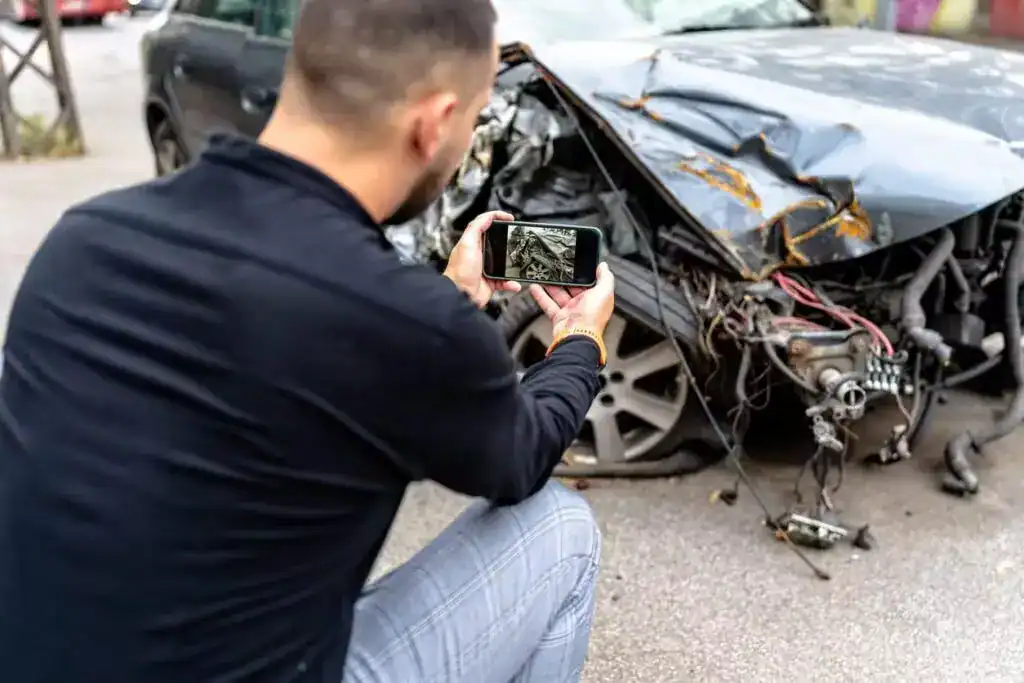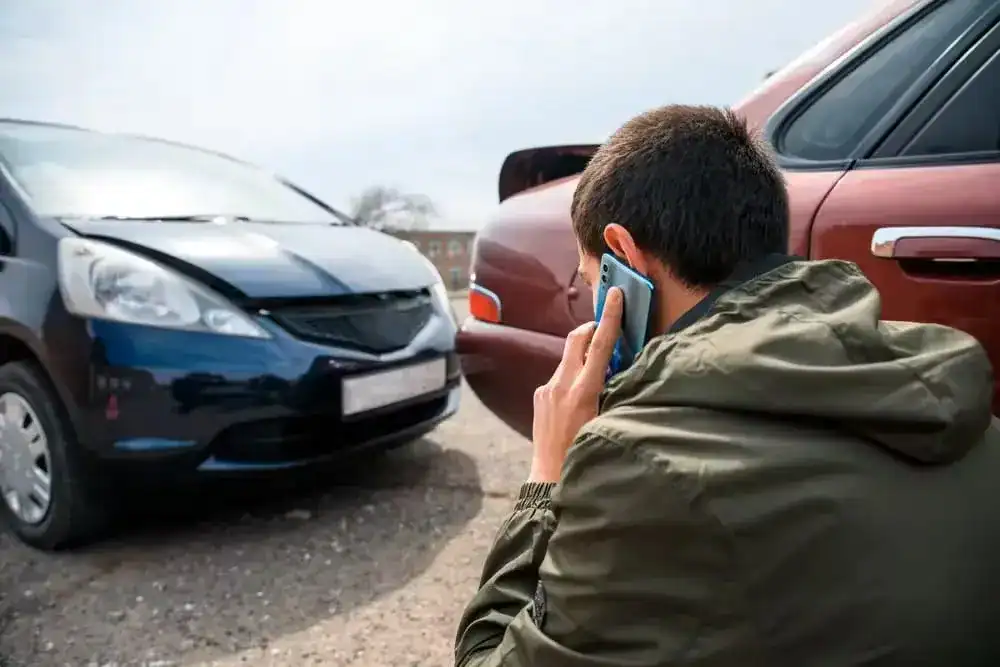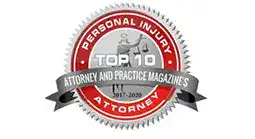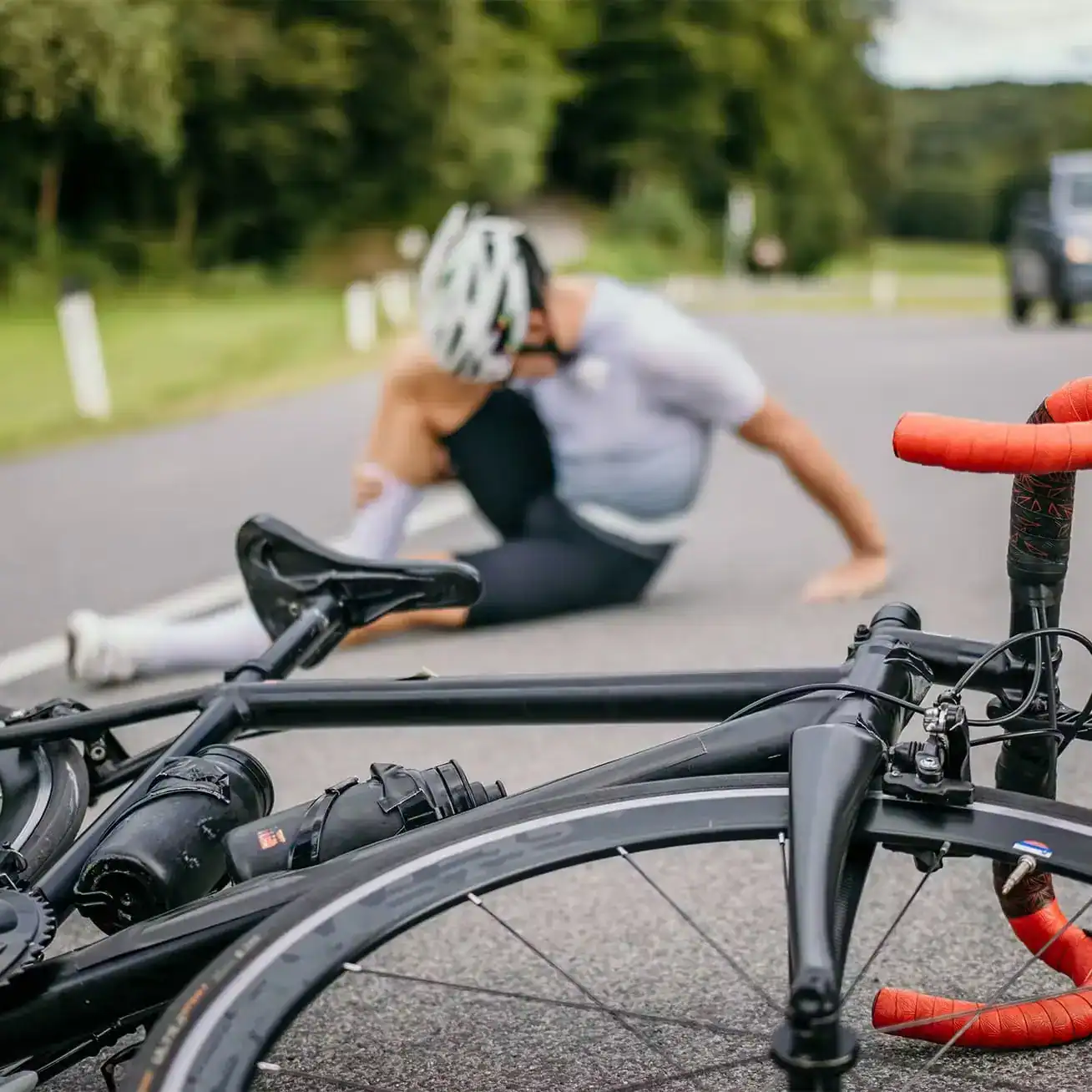
We Win or You
Pay Nothing
We have staff standing by at all hours to help you.
Immediate
Medical Care
Receive the treatment you need, as soon as you need it, with usually no out-of-pocket cost to you.
24/7
Access to Us
Speak with a real human being, no matter what time it is.
Client
Satisfaction
Enjoy working alongside a firm with a sterling reputation for 1,400+ 5-Star Google Reviews.
Drivers helped after car accidents.
Clients Helped.
Over 25 years of helping drivers with car accidents.

Top 6 Things to Do if You Just Got Hit by a Car
Getting hit by a car can be a traumatic and unsettling experience. Car accidents leave most people shaken up, confused, and unsure of what to do next. Immediately after an accident, you may experience a range of emotions, from fear and anxiety to anger and frustration. However, stay calm and focused and take the necessary steps to ensure your safety and well-being, as well as protect your future legal rights.
In this article, we’ll guide you through what to do if you just got hit by a car or another vehicle to prepare and empower you in the event of an accident. These tips can help if your situation involves a multi-vehicle collision, a rear-end crash, a head-on wreck, or even if you were in a bicycle accident or simply a pedestrian at the time of your injury.
Follow these steps to focus your efforts on recovering from the crash more quickly while protecting your right to seek compensation from the at-fault party who caused your injuries. At the end of this post, you can also find answers to some of the most frequently asked questions people often have if they suffered injuries after they got hit by a car.
Assess Your Injuries and Call for Help
Right after a crash, you may not realize what just happened. Try to remain calm, take a deep breath, and analyze your situation. Check yourself for obvious injuries and whether you are in pain or can move. Call for emergency medical attention if you or anyone at the scene requires help. Also, call 911 to report the collision. Ask someone present to call for you if you cannot.
DO NOT leave the accident scene. Unless emergency medical services take you away for care, most states have laws such as the Texas Transportation Code, Chapter 550, Accidents and Accident Reports, which require all parties involved in an accident to stay at the scene until police arrive. If possible, move out of harm’s way, out of the street, onto a sidewalk or shoulder, and help others if you can without causing further harm.
The crash might have injured you, but you might not realize it because of the effects of adrenaline rushing through your body. This fight-or-flight response can mask even serious injuries, so you may not know the extent of the damage until much later. If you experienced any impact from the collision, see your doctor as soon as you can if you refuse emergency treatment at the scene.
Get prompt medical attention for two reasons. First, you may have severe injuries such as internal bleeding or a traumatic brain injury that, if left untreated, could lead to serious medical problems or even death. Second, if you decide to file an insurance claim or civil lawsuit to request compensation for your injuries, you must document your injuries immediately after the crash and how all of your treatment relates to the accident.
Exchange Information with the Driver and Police
If you can, get the responsible driver’s information (name, contact information, and insurance information) at the scene. If EMTs take you to the hospital or you otherwise cannot talk to the driver, ask someone else to gather this information for you. Provide your own contact and insurance information. This should be a brief conversation without anger, accusations, or extensive details.
While you are still at the scene of the accident, DO NOT:
- Accept blame for the accident, even if you may have some responsibility,
- Talk about who is at fault or how the crash happened,
- Say you’re sorry.
Tell the police officers what happened, but only provide the facts. Do not guess or assume what happened. Do not discuss fault for the crash. The police are trained to gather physical evidence and witness statements to determine what happened since they did not witness the crash firsthand. Ask to review the report to check for mistakes. A lawyer can help you amend an inaccurate report.

Document the Scene


Under some state laws, vehicles must move out of the way after an accident to avoid further harm. As a result, the condition of the accident scene will change quickly, sometimes before the police have arrived to verify what happened. Other vehicles traveling through the site may scatter debris, weather can erase tire marks, and other details can be destroyed quickly, so you must preserve evidence as quickly as possible.
Take photos of the accident scene, including damage to all vehicles, the surrounding area, and any injuries you sustained.
Try to document:
- The weather
- Road conditions
- Vehicle placement before being moved
- Crosswalks
- Road signs
- Overgrown greenery that might have contributed to the crash
- Skid marks
- Broken stop lights
- The license plates of the vehicles involved
The more details you capture, the more evidence you have to support your claim. Again, if you can’t do it, ask someone else to take photos and provide the information to the police with their statement. Ask any witnesses for their contact information so your car accident lawyer can find them later if necessary.
Contact Your Insurance Company
Reach out to your insurance company as soon as possible to put them on notice. Check your policy terms to determine how long you have to report any accidents. Usually, policyholders must notify their insurer within a “reasonable amount of time,” so their policy may not provide a clear deadline. The insurance companies involved must have the opportunity to investigate the incident, so don’t wait too long and risk having the insurance company deny your claim because of a technicality.
Give the insurance company the basic facts: the responsible driver’s information and any related documentation, such as a police report or property damage estimates.
Provide basic information, but DO NOT:
- Share many details
- Admit fault
- Post about your accident on social media
- Give a recorded statement without speaking to a personal injury attorney first
Most insurance companies are in business to make money. They profit from receiving policyholders’ premium payments, not by paying accident claims. Insurance companies train their adjusters to offer as little as possible to settle claims, so they will use every opportunity to reduce or deny your claim. Hire legal representation before you deal with the insurers.
Seek Legal Advice
Obtaining legal advice after you get hit by a car is an important step toward protecting your rights and ensuring that you receive the compensation you deserve. A personal injury lawyer can explain your legal options, determine the strength of your case, and handle negotiations with the insurance companies for you.
An experienced lawyer can also navigate the complex legal process and avoid common pitfalls that could jeopardize your case. They can help you gather evidence, such as medical records and witness statements, and build a strong case to support your claim. If you could not preserve evidence at the crash scene, your attorney can gather evidence like security or traffic video evidence, witness statements, and more. The sooner you start working with a personal injury attorney, the more evidence they can preserve.
Additionally, a personal injury lawyer can explain the full extent of your damages, including medical bills, lost income, and pain and suffering. They can calculate the value of your claim and negotiate a fair settlement with the insurance company so you don’t have to deal with aggressive adjusters or lawyers.
Insurance companies are often more concerned with their own bottom line than with your well-being. They may try to pressure you into accepting a lowball settlement or make it difficult for you to receive the compensation you deserve. An experienced lawyer can level the playing field and fight for your rights.
Overall, seeking legal advice after a car can protect your rights, maximize your compensation, and achieve a sense of closure. Don’t hesitate to contact a personal injury lawyer after a car accident. The sooner you partner with an experienced injury law firm, the stronger you will make your overall case.
Take Care of Yourself
While you let your dedicated injury attorney protect your legal rights, you can focus on your physical and mental recovery. Follow any medical advice and treatment plans recommended by your doctor. Attend all therapy sessions and follow-up doctor appointments.
Car accidents are seriously traumatic events that can cause intense mental and emotional damage. Seek emotional support if needed, such as from a therapist or support group. Don’t try to tough it out yourself. If you didn’t cause the accident or your injuries, you (and your family) deserve the care and treatment you need to return to the best life possible.

I Just Got Hit While Walking Down
the Street! What Should I Do?
Chances are, if you were a pedestrian hit by a car, you suffered extreme injuries and the responsible driver may have walked away without a scratch.
If you were a pedestrian hit by a car, take these important steps to ensure your safety, well-being, and protect your legal interests. Here’s a guide on what to do if you’re a pedestrian involved in a car accident:
- Move to safety if possible, especially if the accident happened at night. Use a flashlight to stay visible if you can’t move.
- Call 911 for medical assistance if you’re injured and need emergency care.
- Seek medical attention immediately, even if injuries seem minor, as some may not be apparent right away.
- Collect the driver’s information, including their name, contact details, insurance info, and vehicle specifics (make, model, license plate).
- Get witness information, including names and contact details, for possible statements later.
- Document the scene with photos of the wreckage, traffic signals, and road conditions.
- Report the accident to the police to create an official record for insurance and legal use.
- Preserve evidence, including your clothing, which might be relevant to your case.
- Notify your insurance company, giving them all necessary accident details.
- Avoid admitting fault, and stick to factual information when speaking to police and others involved.
By following these 10 steps, pedestrians can protect their health and take the necessary actions to seek compensation for their injuries.

I Just Got Hit While Riding My Bicycle! What Happens Next?
If you were a bicyclist hit by a car:
- Inspect the bike: Check your bike and take photos of any visible damage. If possible, don’t move your bike until the police arrive.
- Get the driver’s insurance information: Ask the driver for their insurance information, including their policy number and contact information for their insurance company.
- Look for witnesses: Ask anyone who saw the accident for their contact information. Eyewitness accounts can help determine fault and liability.
- Contact a dedicated bicycle accident lawyer: If you got hit by a car while bicycling, you may receive compensation for your injuries and damages. A bicycle personal injury lawyer can explain your legal rights and options, and guide you through the claims process.
- Report the accident to the police: Contact the police to report the accident, and provide them with your contact information and any details you have about the driver and their vehicle.
By taking these steps, bicyclists can protect their rights and seek compensation for their injuries and damages after getting hit by a car.
I Just Got Hit and the Driver Fled the
Scene! What to Do After a Hit and Run?
One of the worst accident situations you may face is a hit and run accident. Not only is it a crime in most states for a driver to leave an accident scene, but doing so may leave the accident victim without the ability to file an insurance claim against an unknown responsible driver’s insurer. If a vehicle hit you and fled the scene, try to remember the type and color of the vehicle and any unusual details. If possible, try to get the license plate number and report it to the police. Also, ask any witnesses for their contact information and what they saw that might help identify the at-fault driver.
Depending on your insurance coverage, you may be able to bring an uninsured motorist (UM) or underinsured motorist (UIM) claim against your own policy if you cannot identify the liable driver. Consulting with a hit and run personal injury lawyer is crucial to understand your legal rights and options. They can guide you through the process and help ensure you take the right steps to seek compensation for your injuries and damages.
What Compensation Can I Recover from a Personal Injury Claim Resulting from a Car Accident?
If a negligent driver hit you and you pursue a personal injury claim against them, you could recover various forms of compensation depending on the circumstances of the case, the extent of your injuries, and the applicable laws in your jurisdiction. Typically, compensation in a personal injury claim aims to cover various losses and damages incurred as a result of the injury. Here are common types of compensation that may be available:
Medical Expenses: This includes reimbursement for past and future medical bills, hospital stays, surgeries, prescription medications, rehabilitation, and other healthcare costs related to the injury.
Lost Wages: If the injury prevents you from working, you may be entitled to compensation for lost income. This includes wages lost during your recovery period and, in cases of severe or permanent injuries, future earning capacity.
Pain and Suffering: Compensation for physical pain, emotional distress, and mental anguish caused by the injury. This type of compensation is often subjective and may vary based on the severity and impact of the injuries.
Property Damage: If your personal property was damaged in the incident (such as a car in a car accident), you may be entitled to compensation for repairs or replacement.
Loss of Consortium: This type of compensation is designed to compensate the injured party’s spouse for the loss of companionship, affection, and intimacy resulting from the injury.
Punitive Damages: In some cases, punitive damages may be awarded to punish the at-fault party for particularly reckless or egregious behavior. Not all cases warrant punitive damages, and their availability depends on the laws of the jurisdiction.
Funeral and Burial Expenses (Wrongful Death Cases): In cases of wrongful death, compensation may cover funeral and burial expenses, as well as the financial loss suffered by the deceased person’s dependents.
Legal Fees and Costs: In some cases, the at-fault party may be required to cover the legal fees and costs associated with pursuing the personal injury claim.
It’s important to note that every personal injury case is unique, and the specific damages you can recover will depend on the facts of your case and the applicable laws in your jurisdiction. To navigate the complexities of a personal injury claim and understand the potential compensation available to you, consult an experienced personal injury attorney. They can assess the details of your case, help you determine liability, and advocate for your rights to secure fair and just compensation.
Frequently Asked Questions
(FAQs) About Getting Hit by a Car
Again, every crash situation differs and each victim’s rights may vary. If you don’t find the answers you need in these frequently asked questions, reach out to an experienced personal injury lawyer right away.
Many accident victims don’t realize if a crash hurt them, or the extent of their injuries, immediately afterward. If your body struck anything during the collision, seek emergency treatment. If you don’t go to the ER from the scene, at a minimum, see your family doctor as quickly as possible following an accident where a car hit you. It’s better to have a doctor examine you in case you have serious internal injuries including brain trauma. If you were not in a vehicle during the accident, get medical care as soon as possible due to the increased likelihood of injuries.
At most, we recommend you only provide basic facts if an insurance company contacts you. Give simple details such as dates, locations, and parties involved if you speak with an adjuster. DO NOT give a recorded statement without obtaining legal representation first. Insurance companies are looking for any way to reduce or deny your claim. A seemingly innocent question such as, ‘How are you?’ that you answer with, ‘Fine, thanks’ can cause trouble because you are really not fine. Let your car accident attorney deal with insurance adjusters so you don’t say anything that could hurt your case later.
In general, you must pay your own expenses, but you may have several alternatives to hold others responsible for the losses you sustain after a crash. No-fault insurance states require an accident victim to file a claim against their own Personal Injury Protection (PIP) coverage first. If PIP won’t cover your expenses, you may then bring a claim against the responsible party. In fault-based insurance states, the victim can bring a claim against the at-fault party and request compensation for several financial losses. Usually, the responsible party’s insurance company pays for the victim’s losses when the victim establishes liability. If the at-fault party does not have insurance, the victim may need to use their own health insurance or uninsured or underinsured coverage if they carry it. In a small percentage of cases, a plaintiff can hold the at-fault party personally liable to pay the expenses from their own assets, but most people do not have sufficient assets to cover a typical victim’s losses.
As mentioned above, the insurance company or state where the crash happened may limit the amount of time you have to file a claim with your insurance company or the at-fault person’s insurer. Ask a skilled injury lawyer to review all relevant policies and state laws so you don’t miss a claim deadline. Each state also has a statute of limitations that creates a window of opportunity for injured victims to file a civil lawsuit against responsible parties. This deadline could give you as little as one year (or less when dealing with governmental entities), and missing your filing opportunity will most likely end your legal claim. Again, talk to a dedicated personal injury attorney to understand all deadlines that apply to your claim so you don’t miss the chance to receive the compensation you deserve.
Houston Office
12777 Jones Rd #297 Houston, TX 77070Get a Free Consultation
2 minute response
24 hours a day, 7 Days a Week
Dedicated Trust Guss Intake Team
"*" indicates required fields

 2 minute response
2 minute response 24 hours a day, 7 Days a Week
24 hours a day, 7 Days a Week Dedicated
Dedicated